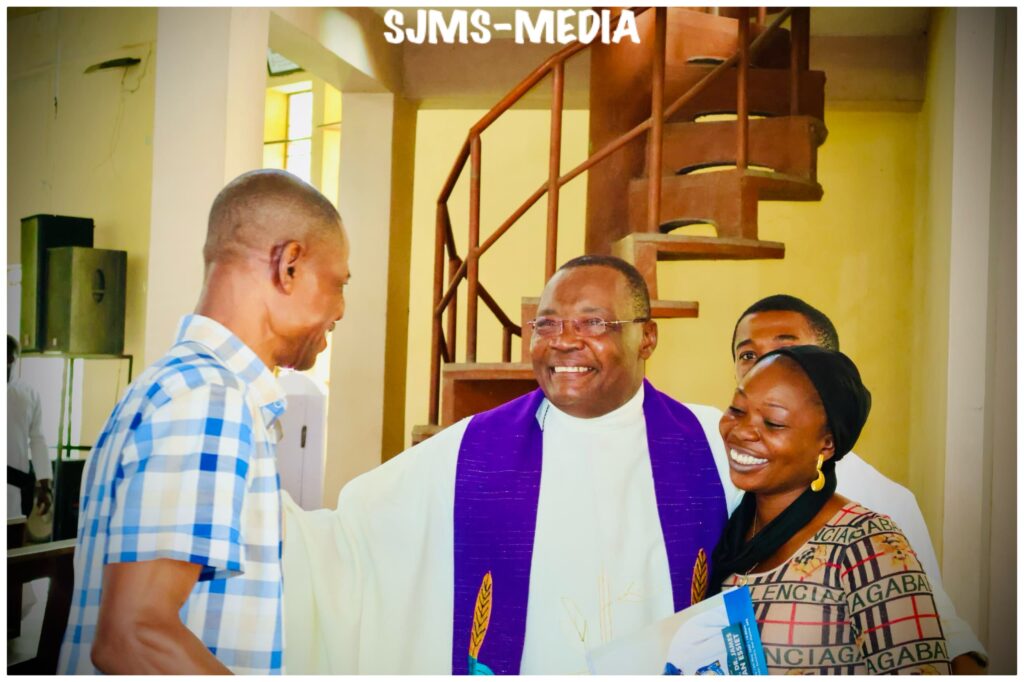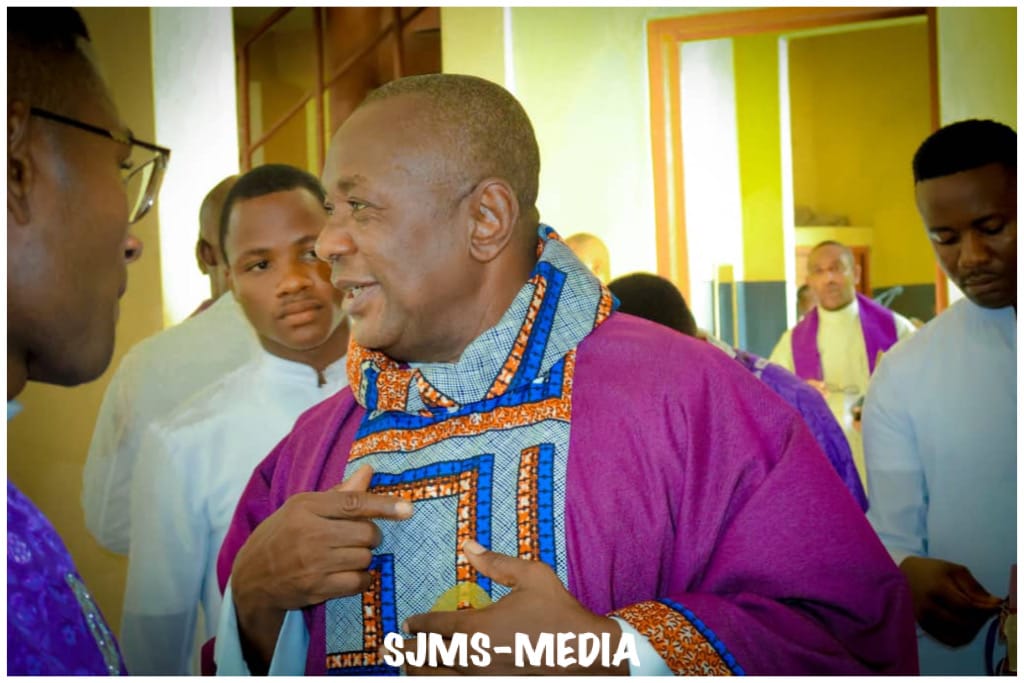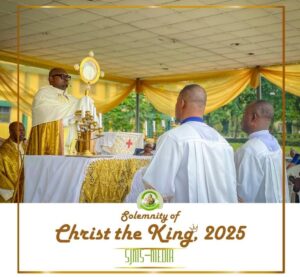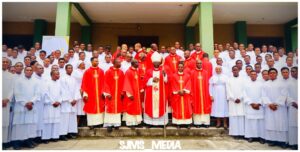The HOLY MASS PRECIDED BY REV. FR. PROF. KEKONG BESONG.
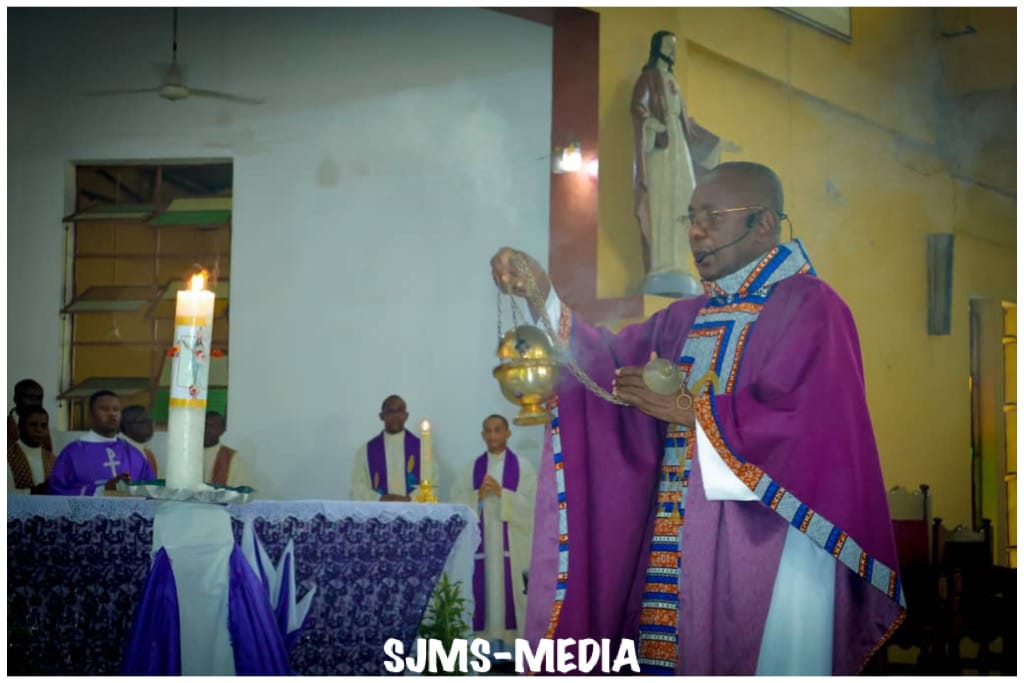
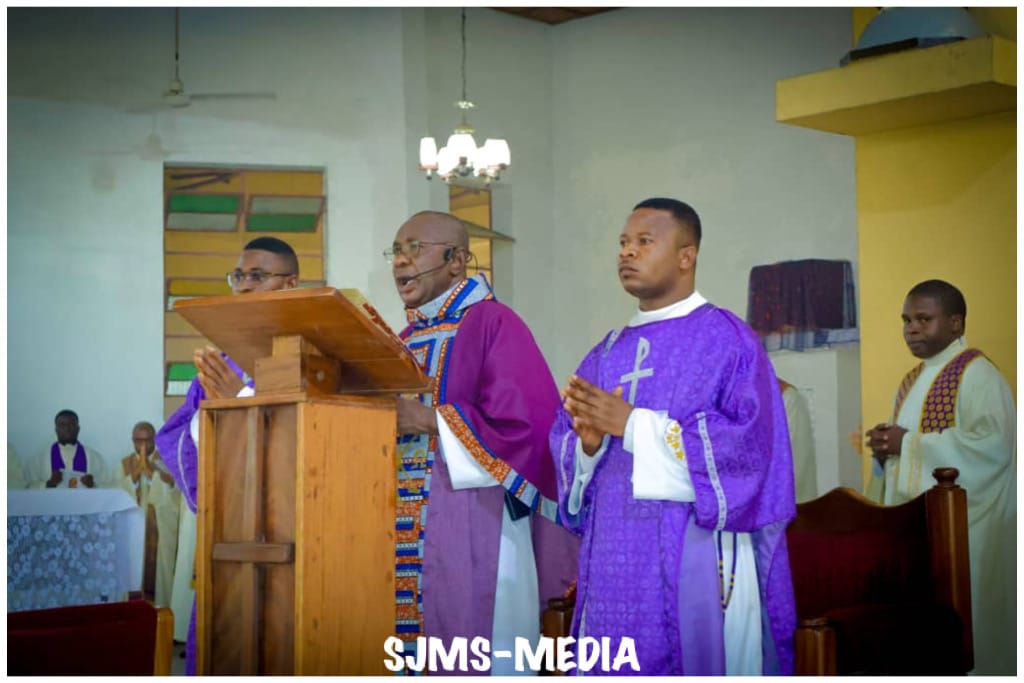
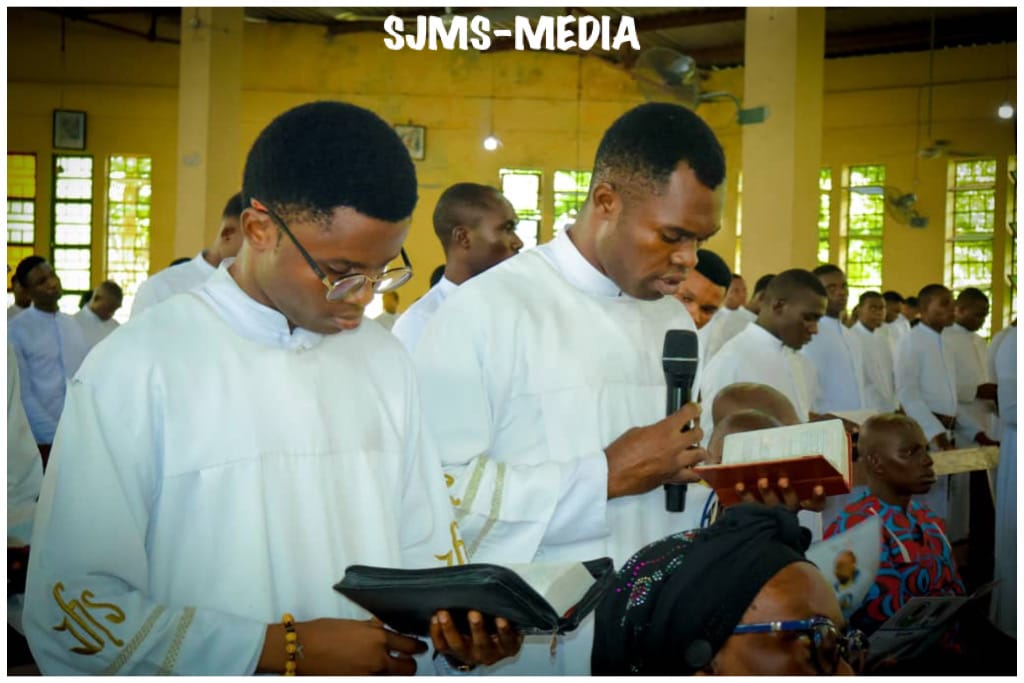
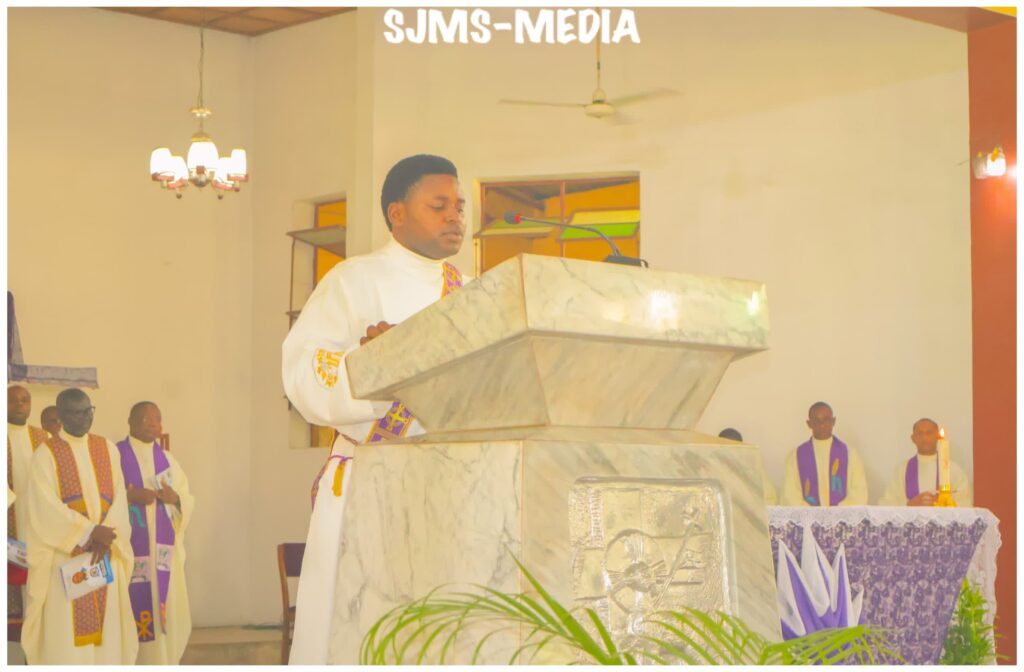
The office for the Dead said during the Mass
The HOMILY by the Chief Celebrant Rev. Fr. Prof. Kekong Bisong, a formator and a priest of the Catholic Diocese of Ogoja.
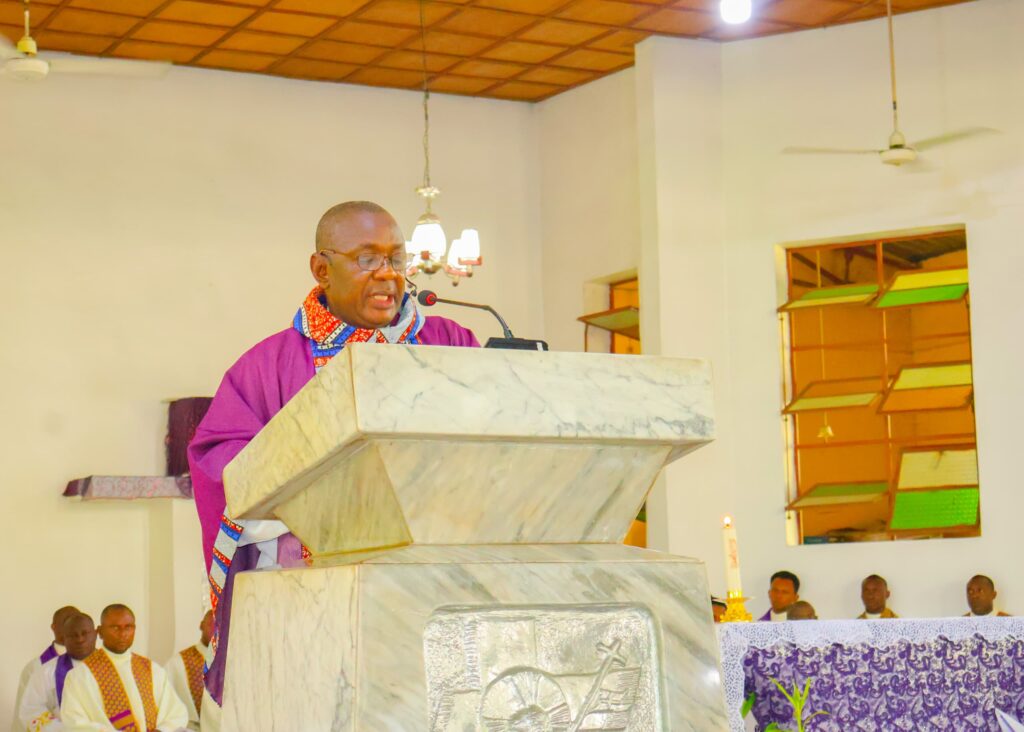
It is Finished/TetelestaiFr James EssietVery Rev Fr. Dr. James Essiet our seminary liturgist, master of liturgical ceremonies, a formator, and a Christian, for you “it is finished.” Whether you are seated in the Cathedral of St. Ann Ikot Ekpene, or participating remotely in an obscure parish, or watching livestream from a living room in Abuja, or joining through social media from a classroom in Europe, or elsewhere, you are all esteemed guests today. For God has profoundly impacted your lives through the enduring legacy of our beloved Fr. James, and I welcome you as brothers and sisters, united in sorrow and celebration.
Fr. James’ life was a reflection of commitment to simplicity, decorum, and devotion. For nearly two decades, Fr. James served especially in this very chapel with dedication and passion, guiding us in the ways of liturgy and worship. His mastery of ceremonial detail was matched only by his humility and kindness. He embodied the very essence of liturgical decorum, bringing reverence and beauty to every celebration.
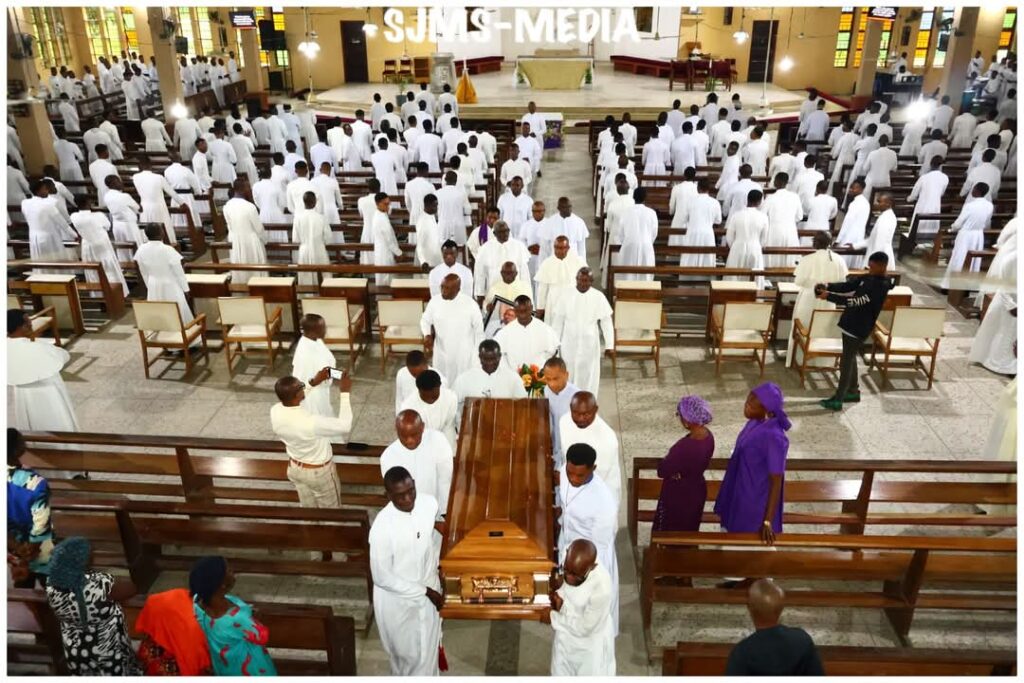
He lived not to accumulate wealth or status, but to serve. He spoke with gently, always choosing words that were few, yet impactful. In our father’s house there are many types of priests. Each one is a singular and unrepeatable individual. Each one is endowed with his own charism. Some priests are essentially ascetic; they are more at home in the monastic setting than in the parish hall. Others are bookworms, others have their charism in managing institutions, yet others are meticulous authoritarian administrators and strict observers of the rubrics. But priests like Fr James are destined to help us see the human face of the sacred order. They remind us that St Peter is not St Paul. That a sincere smile does no harm. That a good laugh in a good company can be meritorious. That we can go to heaven with a soft face.
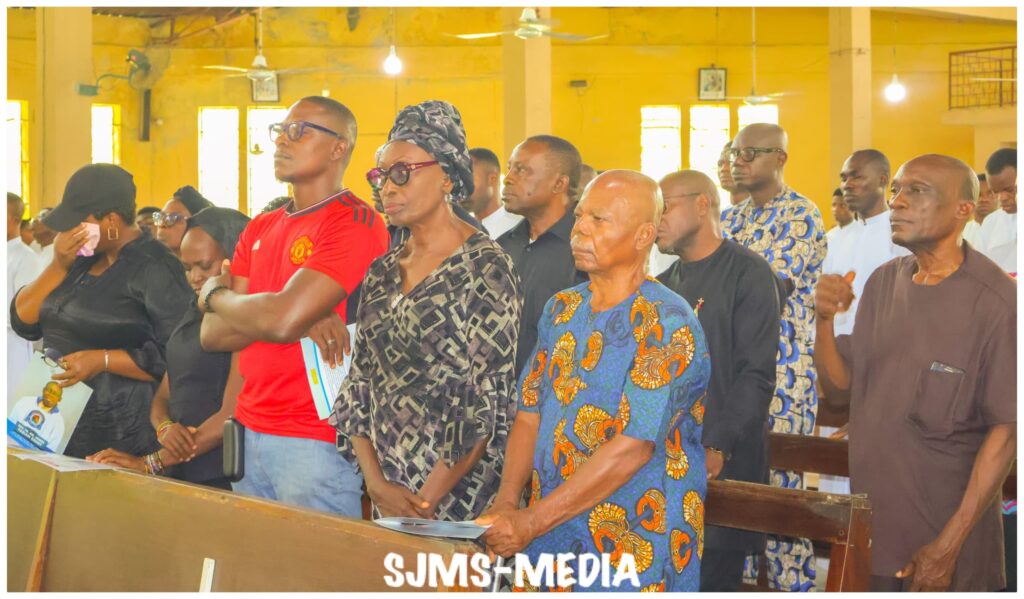

We have come to bury and not praise. But the priesthood is full of lessons.What lesson can we learn from the death of Fr. James? There are enough lessons to go round. • Lessons for seminarians: to live with purpose and faithfulness• Lessons for hospitals: to prioritize care and compassion• Lessons for St Joseph Major Seminary: to nurture vocations and spiritual growth• Lessons for politicians: to serve with integrity and humility• Lessons for our bishops: to be true shepherds, not just bureaucrats • Lessons for priests: to be authentic spiritual leaders, guiding with wisdom and compassion• However, let us focus on the very last lesson of Christ on the Cross. Tetelestai/ It is finishedFor Fr James “It is finished.” When our Lord Jesus Christ died a painful death on the cross, he died with the expression “Eloi, Eloi, lema sabachthani.” That is “My God my God, why have you forsaken me” (Mark 15:34). The narrative goes on to tell that, when he shouted with a great sound, he gave up his spirit. It is in every one of the Gospels, it is in Matthew, in Mark and in Luke. But there is one Gospel which goes further.
The Gospel of John tells us that Jesus died with a shout Tetelestai: “It is finished” (Jn.19:30). “Tetelestai” is derived from the verb “teleo,” which means “to bring to an end, to complete, or to accomplish.” The perfect tense of “teleo” used in “Tetelestai” signifies an action that has been completed in the past with results continuing into the present. In essence, “Tetelestai” conveys that something has reached its intended goal or final stage. In the biblical context,
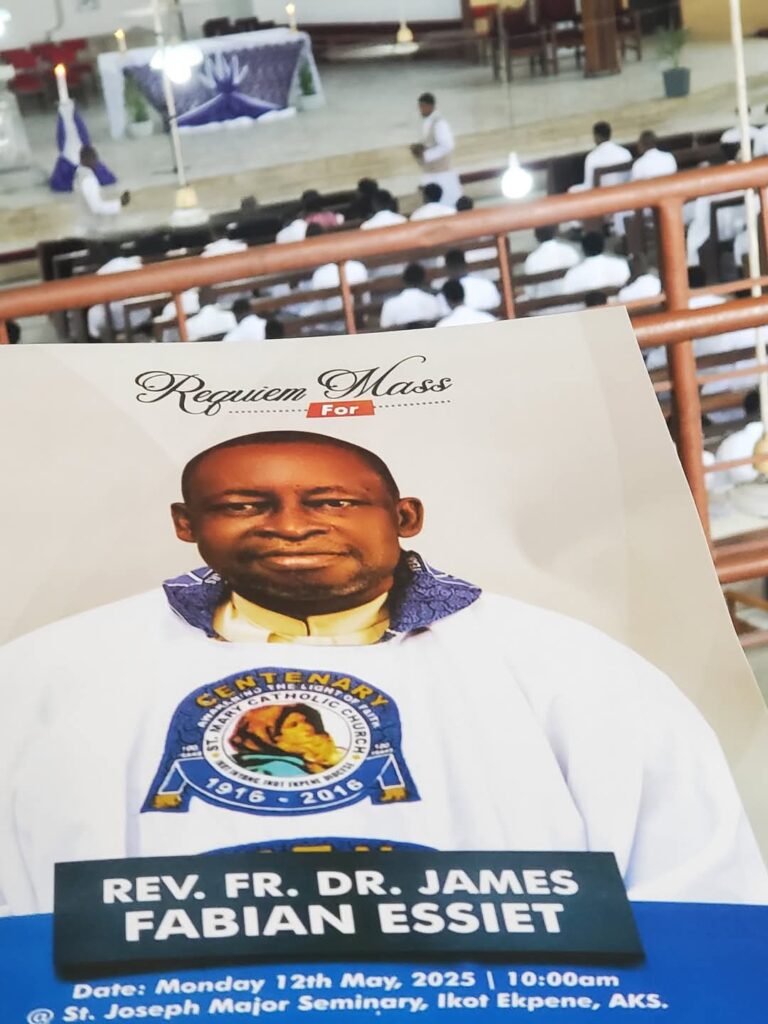
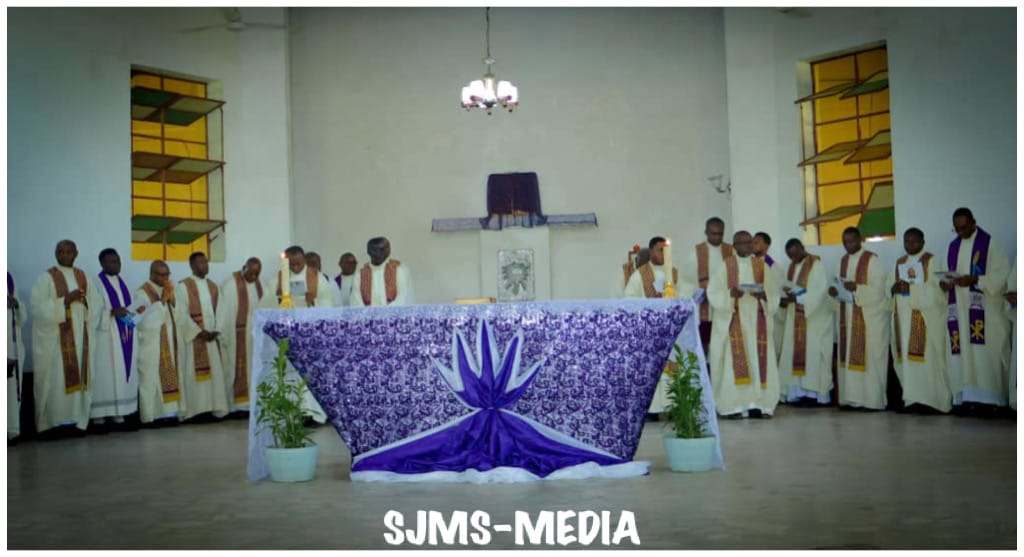
“Tetelestai” is more than just a statement of completion; it’s a declaration of fulfillment. Jesus’ cry of “Tetelestai” on the cross affirms that His mission of redemption has been perfectly fulfilled. It represents the completion of Jesus’ mission in the world, the accomplishment of God’s redemptive plan, and the assurance of our salvation. Understanding the profound definition of “Tetelestai” enables us to embrace the liberty, assurance, and empowerment that come from the finished work of Christ. This moment for Fr James is Tetelestai and for us it is a reminder.• Tetelestai means the goal has been accomplished• Tetelestai (it is finished) is the victor’s shout;• Tetelestai (it is finished) is the cry of a man who has completed his task;• Tetelestai (it is finished) is the cry of a man who has won through the struggle;• Tetelestai (it is finished) is the cry of a man who has come out of the dark into the glory of the light;• Tetelestai (it is finished) declares victory over sin, death, and darkness.. In the biblical tradition, debt is often viewed as a form of bondage, where individuals become enslaved to their creditors. The concept of “Tetelestai” liberates believers from this bondage, signifying that Christ has paid the ultimate debt on their behalf.It is “Tetelestai” that will form the basis and the assurance made in the first reading from the Book of Wisdom, that the souls of the righteous are in the hands of God. It is consoling that the author of the book of Wisdom offers us a theology of death that is filled with hope. In Paul and for Paul this theology takes a new and richer dimension “our citizenship is in heaven?”
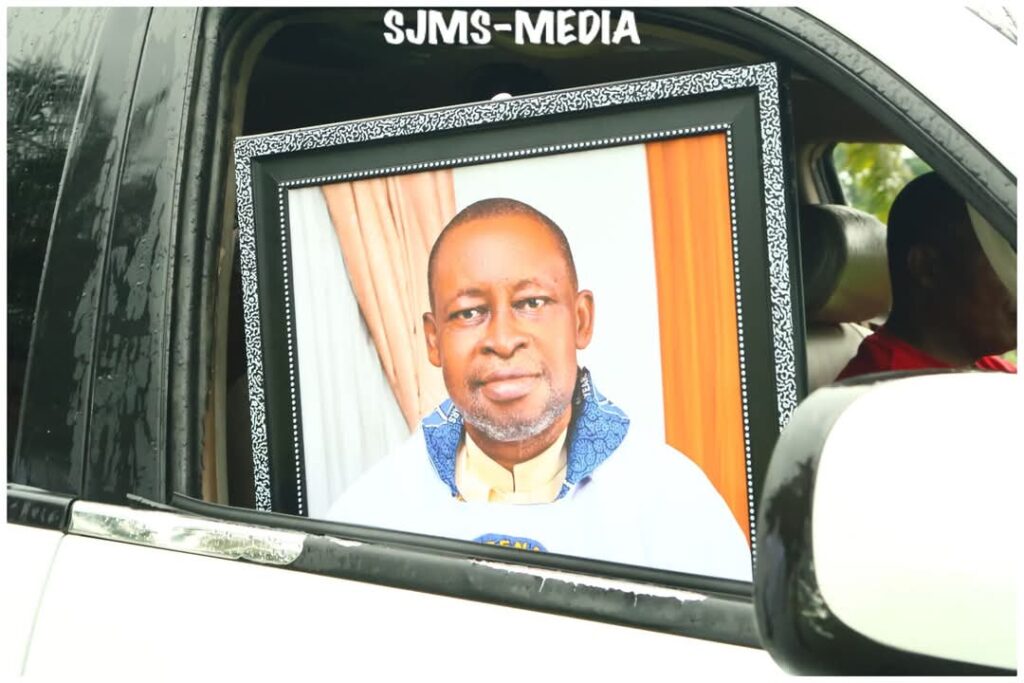
The issue is not whether one dies young or old, rich or poor. The issue is not whether one dies of kidney failure or of old age or even of starvation, it is not whether one completed or did not complete his project on earth. It is rather that whoever believes in Christ, even if he dies, will live again, and whoever is alive and believes in him shall never die (John 11: 25-26). This is the foundation of one of the great principles of St. Paul. In the bold metaphor of St Paul, our citizenship,” he says, “is in heaven.” The person who has lived and died in Christ is still in Christ even in death and will rise in him. The children of the resurrection know that for Christians, death does not have the final word, but that the real life can only be found beyond the grave. They know that physical death has no power whatsoever to frustrate God’s plan of eternal life for his children. They know that far from being annihilation death is a transition from temporal life to eternal life, a promotion from the misery of this world to the glory of God’s reign.

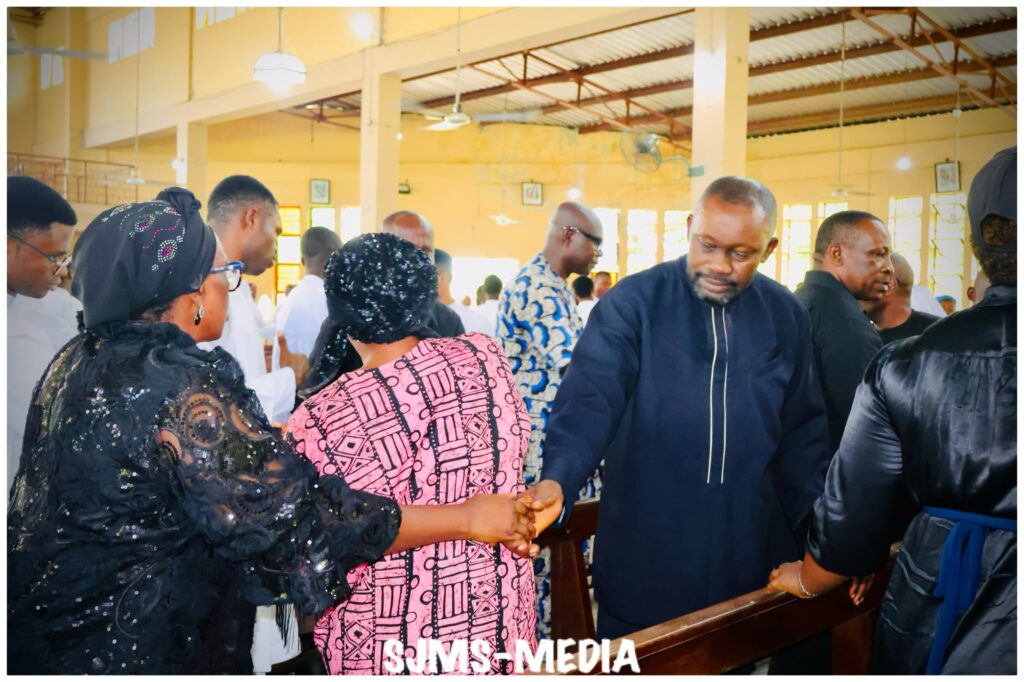
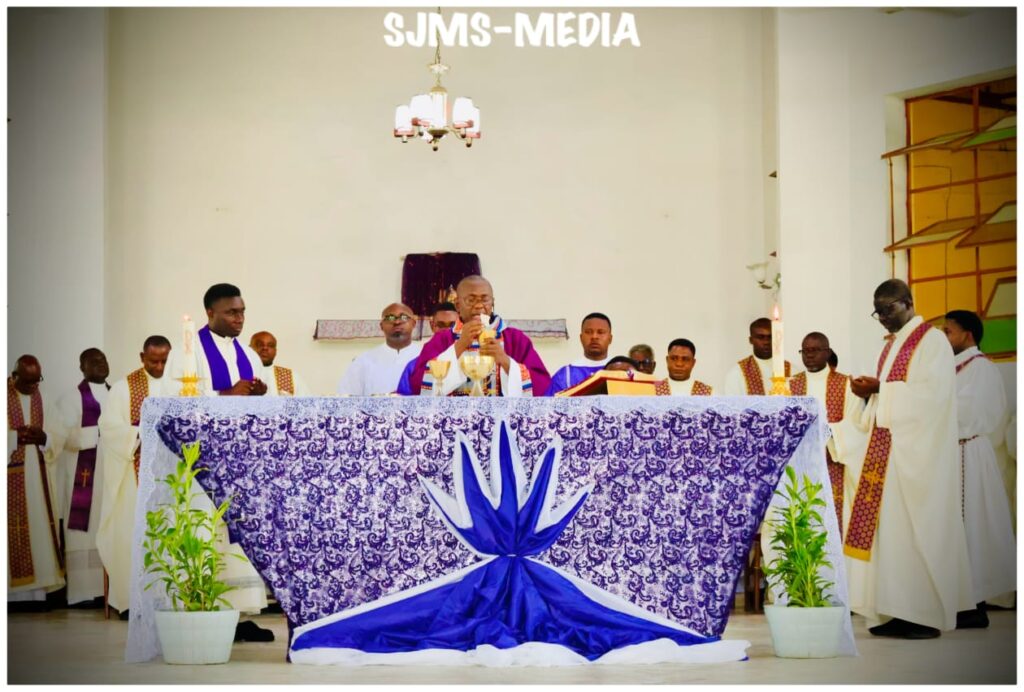
Today we hear the words of Jesus to Martha: “I am the Resurrection and the Life; whoever believes in me, even if he dies, will live, and everyone who lives and believes in me will never die. Do you believe this?” Hopefully our answer is that of Martha: “Yes, Lord; I believe that you are the Christ, the Son of God”,. Jesus performed many miracles. But the miracle of raising Lazarus from the dead could be considered to be one of the most outstanding. In the Gospel we have just read Jesus said, “Lazarus, come out!” (John 11:43) Jesus says to each of us also, “Come out of your tomb, come out of your bondage. Do not live in the darkness, live in the light. Do not live in fear, live in faith.” When Lazarus came out of the tomb, Jesus then said, “Unbind him, let him go free.” Jesus also says to each of us, “Be unbound and go free. Live with my life. ” (John 11:44)The passing of Fr James during the Easter Octave has prompted a range of emotions, with some individuals opting to frame his transition as a “celebration of life.” In recent years, the notion that funerals should be reframed as “celebrations of life” has gained footing. However, I must respectfully object. The truth is that it is a funeral. We are gathered not only because someone has lived but because he has died. Yes, many of us are comfortable with the quote attributed to St. Augustine “We are Easter people and Alleluia is our song.” But this quote should not be manipulated in support of the culture of a denial of death. It is essential to acknowledge that this quote has, at times, been misappropriated to perpetuate a culture of denial regarding death. The tendency to euphemize death, referring to funeral rites as “celebrations of life,” rather than acknowledging the stark reality of mortality, undermines the very essence of our Christian faith. As Catholics, we must confront the reality of death head-on, even as we proclaim our hope in the resurrection. For us Catholics, the funeral mass is the principal celebration of the mercy of God. Mass as an essential part of the Catholic funeral rite is not a reward for perfection, it is not canonization, but a celebration of God’s Mercy, it is meant to establish the paschal connection between baptism, death and resurrection of the Christian. The paschal mystery is not just about resurrection. The Catholic Order of Christian Funerals explicitly avoids referring to the funeral Mass as a “Mass of the Resurrection.” We affirm in the Creed that Jesus suffered, was crucified, he died, was buried, descended to the dead, rose again and ascended into heaven. We are Easter people, and Alleluia is, indeed, our song. Yet, we must not forget that this song is born of the darkness of Good Friday, and the silence of Holy Saturday. It is in the tension between death and resurrection that we find the very essence of our faith.The lesson before us is obvious. We live in a fast-changing world, nothing seems to be certain, except one thing. We will all die. Today we are reminded that it is the one thing which will happen to each one of us. The only reasonable response by any reasonable person is to be aware and be ready, death is certain. Since death is certain we should stop fearing death. And for us Christian’s death is not the final full stop, it is the gateway of heaven and the beginning of a new life. Another great lesson of any Memorial Service, of any funeral is that of the emptiness and vanity of all our earthly pursuits. So vanishes the glory of the world. All that struggle, all that anxiety is to no purpose.
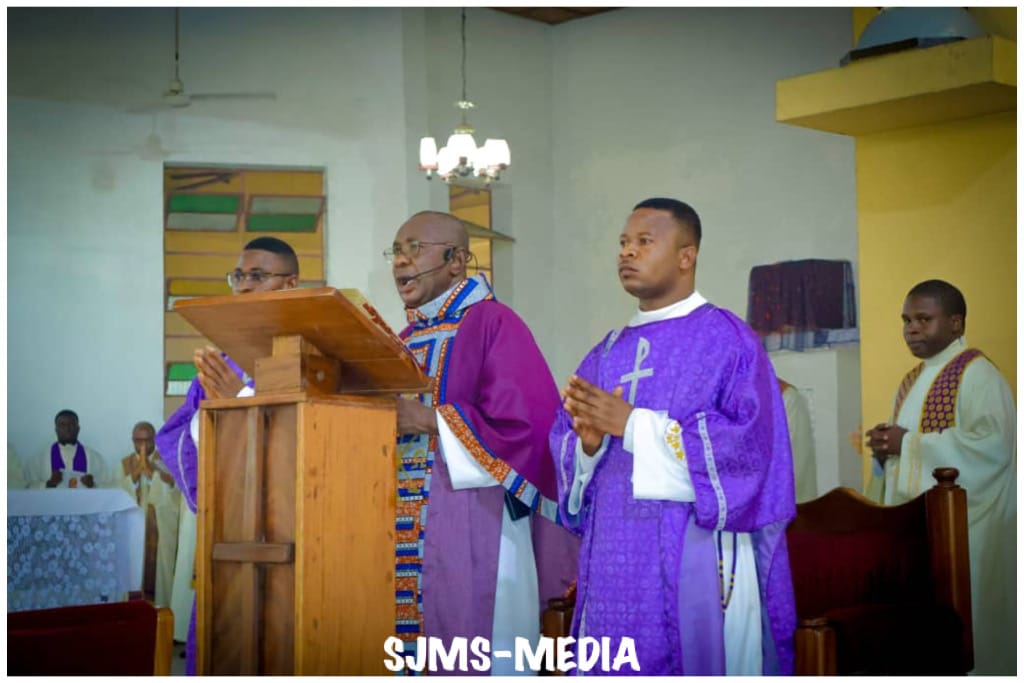
Fr James will enter the grave with no liturgical rubrics, no library, no money, with no diploma, with no house, no thesis to moderate and no examination scripts to score. Like Job in the Old Testament naked he came into this world and naked he goes out of it. Therefore, it is clear; this world of glamour and show, of money and pleasure and ambition, this world of wealth, of name and of possession, this world is a foam, this world of power and show of power is an inflated balloon. The world of my parish is bigger than your own, my car is newer than you, this world of I big pass my neighbour is a brief deceptive ecstasy. These are all appearances and different from realities. From Immanuel Kant critique of metaphysics to Soren Kierkegaard’s existential leap of faith we must reexamine our assumptions. And so, if we are wise, we should now see through the empty balloon. We should learn to despise the values of this world. Let us rather lift up our heads and our hearts and pursue the values of the spirit, the values that survive the grave. In this moment of profound vulnerability, we are invited to surrender to the mystery of faith. We are called to trust in the God who raises the dead, who brings light out of darkness, and who transforms sorrow into joy. We are reminded that our Easter Alleluia is not a shallow pride, but rather, a deep and abiding hope. And so, as we bid farewell to our beloved brother, formator, liturgist and master of liturgical ceremonies, we do so with the confidence of Easter people. We do so with the hope of the resurrection. We do so with the song of Alleluia on our lips, and the promise of eternal life in our hearts. We do so in humility.Without humility, even the apostles; especially the sons of Zebedee, those simple fishermen saints are like us- claiming and counter claiming, arguing, quarrelsome, ambitious and in rivalry; if need be, using unfair means of nepotism, dragging in their mother to use her influence to “work it”. After Jesus rebukes, we seem to have learnt no lesson. All we seem to do is to struggle for positions of power and advantage. The imperative of service can be and is often lost, we see people and even priests’ angle and intrigue for positions of power, for future opportunities of money, name and fame. The goal used to be for big parishes for money and power over money and people, now it includes connections. We must resolve to take seriously the Lord’s lesion on humility and simple acceptance of whatever God Himself asks us to do. And let us be poor and weak so that God’s power may shine out in our weakness. Let us please allow God to retain the liberty to reward us if and when He wills. And let us stop the false impression of thinking that juicy posting, access to power are God’s rewards for good behaviour. Remember the phrase; “Your reward is in heaven.” There is a special need for the renewal of our priestly commitment today for our people and for our times. Take poverty of the spirit, today’s spirit is that of a craze for possessing, having and grabbing leading to the malicious idolatry- of material things. We see it at work in a few snatching all, while the many remain totally disposed and impoverished. Not only at the secular world scale generally but now even within the church. The general corruption is due to the inordinate ambition to have and to hold material possessions and the name and prestige they confer. There is a rampage out there. Even the priests and consecrated persons have joined the rat race for money and the negative comforts and false security it offers. We need more detachment, but unfortunately poverty of the spirit is especially difficult for the poor and most of us who come from poor families need more discipline. Discipline, of the mind, discipline of the heart, discipline of the will, discipline of the things you desire, discipline of the body. Discipline not imposed from outside by fear, but a free and willing discipline. Fear has no place in our hearts when there is no attachment to wealth, to nobility, to family, and to the body. Discipline is a call to Poverty, Chastity and Obedience through humility, prayer and the sacraments.The Christian call is to imitate Christ, the humble servant, the meek lamb led to slaughter. Let us reread and relearn scripture, eliminating any association with raw power, corrupting ambition, and structures that elevate some at the expense of others. The life of Fr James and his exercise of the priesthood was a demonstration to this call. He served with humility, compassion, and kindness. May we, like Christ, be willing to let go of power and prestige, and instead become humble servants of the Gospel. Just a few days ago the emergence of Pope Leo XIV should signal a very powerful message for our Church. He is the one who said who “The Bishop is a pastor , not a manger.” That statement will not require a commentary and I will not make any. However the choice of the name “Leo” reflects the aspiration of his papacy. Historically Leo is associated with Social Justice, Leo the XIII was known for his groundbreaking encyclical “Renumn Novarum” which addressed the If I were to make a wish list for our church, for our priests and future priests, I will not forget Pope Francis in a hurry, in the spirit of the synod of synodality I would include a prayer for a church in which the corrupting influence of money is drastically reduced, and ambition for wealth no longer disfigures the bride of Christ. My wish list for our church will include a prayer:
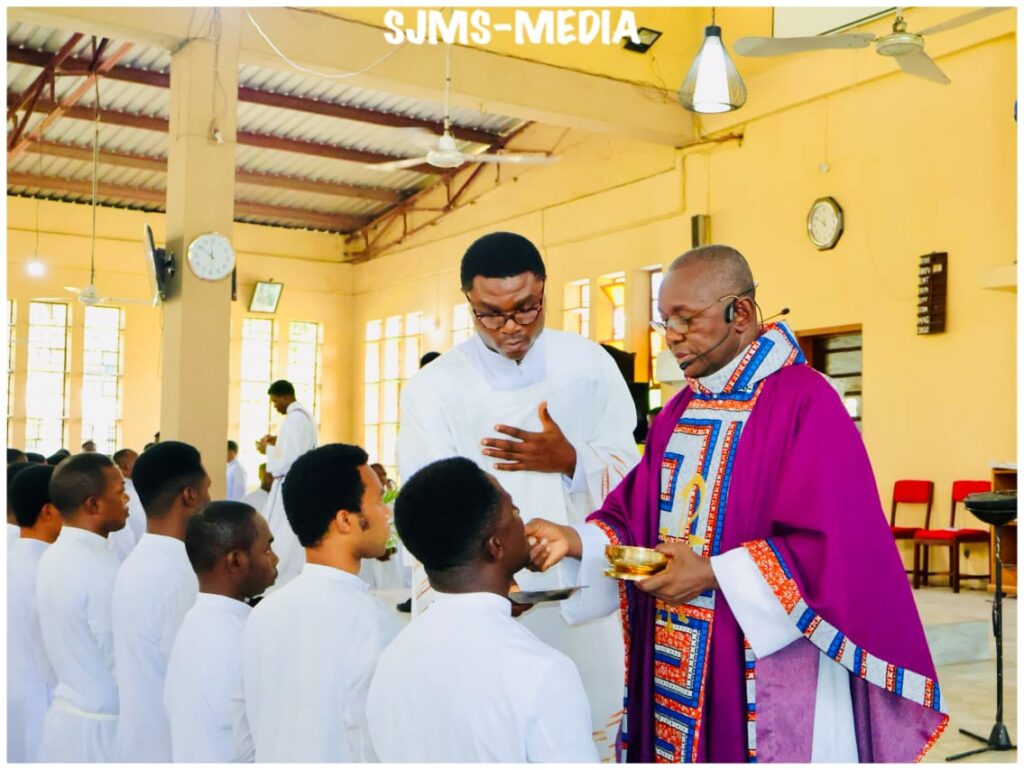
May our priests be shepherds who listen, who hear the cries of the poor, the marginalized, and the vulnerable. May our priests be prophets who speak truth to power, who challenge injustice, and who bring hope to the despairing. May our priests be pastors who nurture, who guide, and who empower their flock to become the best version of themselves. May our priests be missionaries who go beyond their comfort zones, who reach out to the peripheries, and who bring the Good News to all. May our priests be men of prayer, who seek God’s will, who trust in His providence, and who find strength in His presence. May our priests be leaders who serve, who empower others, and who build communities that are inclusive, compassionate, and just. May our priests be witnesses to the joy of the Gospel, who radiate hope, who share their faith, and who inspire others to do the same. May our priests be companions to those they serve in their journey to God, who walk with them, who guide them, and who help them to find their way.As we mourn Pope Francis let us journey with him through the Synod on Synodality. Let us be reminded that our Church is called to be a listening Church: A Church that hears the whispers of the Holy Spirit, the cries of the marginalized, and the concerns of the faithful.In a day like this we also have an obligation to look at the contemporary image of the priesthood. And models from the scriptures come handy from the letter to the Hebrews where like Christ himself, the high priest must be “holy, innocent, unpolluted, and set apart from sinners.” The liturgical hymn Iste confessor describes him as “pious, prudent, humble, modest and leading a sober life without guilt.” A ceremony like this also offers us an opportunity, even an imperative to look at the priesthood from the perspective or the problems and difficulties and embarrassments and frustrations we confront in the field. When we think of the overflowing pews in our churches and Sunday services , the significant number of priests ministering to a significant number of our faithful, when we think of our seminaries and the convents literally spilling over with candidates, there are all evidences of a successful ministry . But if we take a critical look at either the Church within itself or the environing society it operates in, we see obvious weaknesses; various degrees of various spiritual decay. In general our religiosity, our Christianity has become more exterior than interior, pandering to various forms of hypocrisy; • more material than spiritual,
• more of liturgical show than inner conversion, • more of rhetoric than ethical conviction. The signs are more obvious in the values or disvalues we cherish, aspire and even applaud. Our leadership should be of those who are prepared to take the first step, in reaching out to those who are excluded and marginalized, in offering and asking for forgiveness. The zeal of dedicating ourselves is costly. Without any claim of originality, it is costly because grace is costly.
• Cheap Grace means Prayer without sacrifice
• Cheap Grace means Love without Commitment
• Cheap Grace means Authority without service
• Cheap Grace means Law without Justice• Cheap Grace means Education with no character transformation
• Cheap Grace means Enjoyment without discipline
• Cheap Grace means Criticism without charity
• Cheap Grace means honour without responsibility
• Cheap Grace means Confession without repentance• Cheap Grace means celibacy without chastity
• Cheap Grace means Baptism without conversion
• Cheap Grace is bigger rectories and fewer occupants
• Cheap Grace is more certificates and lesser knowledge• Cheap Grace is more experts and more problems
• Cheap Grace is to multiple our possessions and reduced our valuesWe most be attentive to Dietrich Bonhoeffer. Costly grace is the grace that comes from the Cross. Such grace is costly because it calls us to follow, and it is grace because it calls us to follow Jesus Christ. It is costly because it cost a man his life and it is grace because it gives a man the only true life. It is costly because it condemns sin and it is grace because it justifies the sinner. And above all it is costly because it cost God the life of his SonI come to you from the Boki. In the heart of the Boki jungle, a legend has been passed down through generations about the majestic elephants and the treasured Iroko trees. The story goes that the trees, which were highly valued by the community, began to fall one by one, leaving the people of Boki disoriented and concerned. As the villagers searched for answers, some pointed accusing fingers at the elephants. They believed that the elephants, which would often lean against the trees to support their massive bodies while sleeping, were responsible for the trees’ downfall. It seemed plausible, as the elephants’ enormous weight could potentially cause the trees to topple over.However, the elephants were not the true culprits. It was the TERMITES.
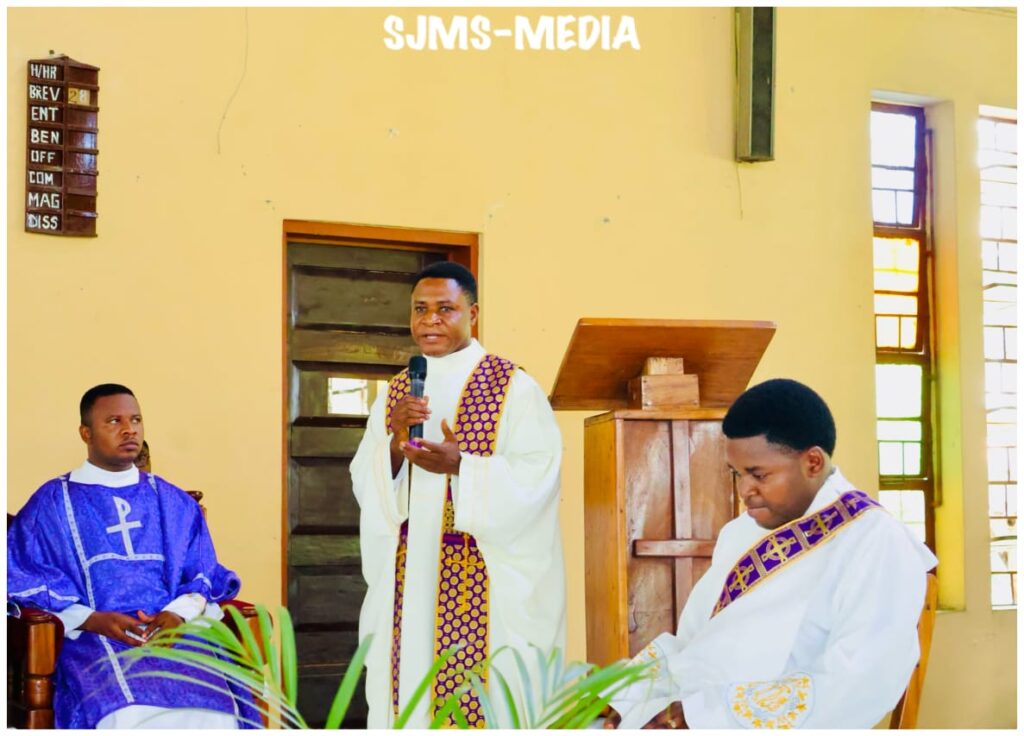
Beware of the destructive power of seemingly insignificant actions! The termites are often the culprits behind the downfall of even the mightiest Iroko trees. Those tiny insects weaken the structure and causing it to collapse. As a Catholic I am conscious of my tradition of mortal and Venial sin, but my Boki heritage aways arms me against the termites.
• Those tiny acts of dishonesty are termites that eat away at our character• The accumulated tiny gossip termites that damage relationships.
• Omitting to act justly termites that weaken our sense of fairness.
• Those tiny lies are termites that destroy trust.
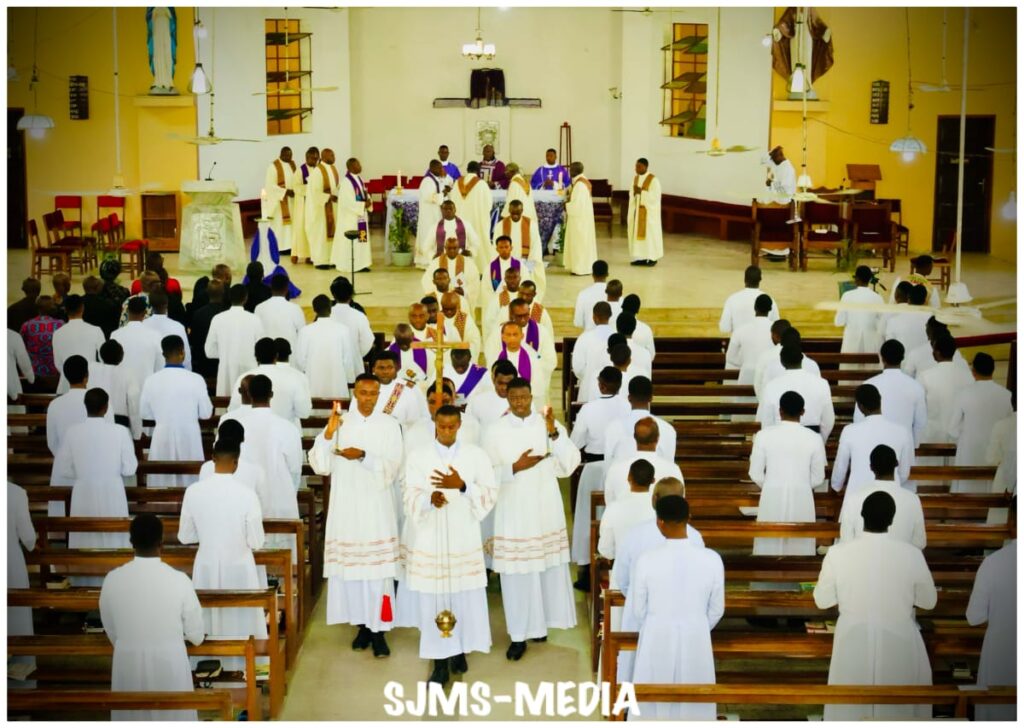
• Small acts of cruelty like termites that hurt others.• Failing acts to keep promises termites that break bonds.
• Tiny moments of cowardice are termites that erode courage.• Selfish actions are like termites that harm the community.• Ignoring the needy are termites that decay compassion.
• Acts Intellectual laziness are termites that undermine progress.
• Poor etiquettes are termites that erode respect• Abuse of authority is like termites that destroy trust in leadership.As we reflect on the life and legacy of Fr James Essiet, three titles traditionally associated with the Blessed Virgin Mary come to mind: Seat of Wisdom, Comforter of the Afflicted, and cause of Our Joy. These epithets, imbued with profound spiritual significance, find a striking parallel in the life and ministry of our brother and friend. James Essiet Good night and good morning.
